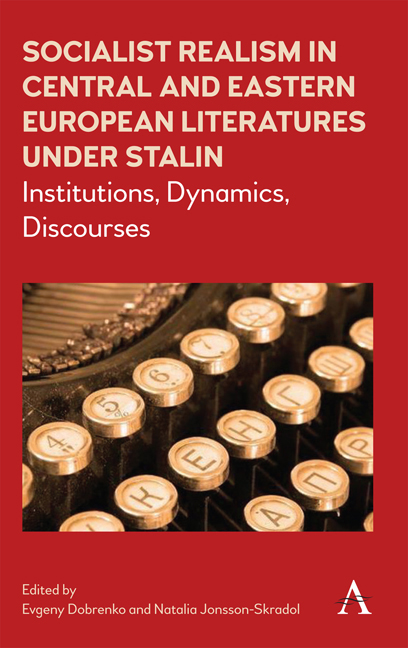 Socialist Realism in Central and Eastern European Literatures under Stalin
Socialist Realism in Central and Eastern European Literatures under Stalin Book contents
- Frontmatter
- Contents
- Acknowledgements
- Introduction
- Part 1 Institutions
- Part 2 Dynamics
- Part 3 Discourses
- 15 Introducing Socialist Realism in Hungary, 1945– 51: How Politics Made Aesthetics
- 16 When Writers Turn against Themselves: The Soviet Model and the Bulgarian Experience, 1946–56
- 17 Big Brother's Gravity: East European Literature in the Mirror of Soviet ‘Thick Journals’ in the Late 1940s
- 18 The Coming One: Prolegomena to the Positive Hero of Czech Socialist Realism as a Transforming and Transformed Subject
- 19 Will Freedom Sing as Beautifully as Captives Sang about It? Reshaping the Croatian Canon, 1945–55
- 20 The Salon in the Camp: Friendship Societies and the Literary Public Sphere in the SBZ and Early GDR
- Conclusion
- List of Contributors
- Index
17 - Big Brother's Gravity: East European Literature in the Mirror of Soviet ‘Thick Journals’ in the Late 1940s
from Part 3 - Discourses
Published online by Cambridge University Press: 10 May 2018
- Frontmatter
- Contents
- Acknowledgements
- Introduction
- Part 1 Institutions
- Part 2 Dynamics
- Part 3 Discourses
- 15 Introducing Socialist Realism in Hungary, 1945– 51: How Politics Made Aesthetics
- 16 When Writers Turn against Themselves: The Soviet Model and the Bulgarian Experience, 1946–56
- 17 Big Brother's Gravity: East European Literature in the Mirror of Soviet ‘Thick Journals’ in the Late 1940s
- 18 The Coming One: Prolegomena to the Positive Hero of Czech Socialist Realism as a Transforming and Transformed Subject
- 19 Will Freedom Sing as Beautifully as Captives Sang about It? Reshaping the Croatian Canon, 1945–55
- 20 The Salon in the Camp: Friendship Societies and the Literary Public Sphere in the SBZ and Early GDR
- Conclusion
- List of Contributors
- Index
Summary
A literary magazine, or a ‘thick journal’, was a unique element of Soviet literary culture. Modelled on pre- revolutionary literary magazines that published the writings of authors belonging to a certain creative movement, or works of a certain genre, in the Soviet time thick journals turned into a voice of the authorities, promoting the ‘ideologically correct’ literature of the new age. After all the writers’ organizations in the USSR had been disbanded in 1932 and the Soviet Writers’ Congress called shortly thereafter to set the standards of socialist realism, the new function of thick journals became clear: they were to operate as propaganda organs for socialist realist art, their journalistic sections actively and directly promoting the Soviet ideology. Evolving together with state policy, by the end of the 1930s the Soviet thick journals turned into an imperial institution. Though published in Russian and dealing supposedly with Russian literature only, they also introduced the readers to literary works from non- Russian parts of the Soviet empire, frequently featuring translations of texts of some length (mostly novels) originally written in either Ukrainian or Belorussian. Translations of shorter writings (poetry or short stories, excerpts from epic poems) from other languages of the USSR were printed with less frequency, but they, too, saw light at regular intervals. As the territory of the Soviet empire grew, so did the number of literary cultures of the newly ‘liberated nations’ covered by the thick journals. Thus, for instance, Issue 9 of Novyi Mir for 1940 opened with poems by Liudas Gira and Johannes Barbarus, translated from Lithuanian and Estonian, respectively. The issue did not feature anything by a Latvian poet, but this was compensated for by Gira's first poem, devoted to the ever- lasting friendship between the Letts and the Lithuanians. M. Zenkevich's article ‘The Poetry of New Soviet Republics (On the Poems by Johannes Barbarus and Liudas Gira)’ was the first piece in the bibliographical section of the same issue. The appearance of the translations signalled the official inclusion of the poetry of the Baltic states into the new literature of the Soviet Union.
In the post- war period the imperial trends of Soviet ideology became stronger.
- Type
- Chapter
- Information
- Socialist Realism in Central and Eastern European Literatures under StalinInstitutions, Dynamics, Discourses, pp. 281 - 296Publisher: Anthem PressPrint publication year: 2018


